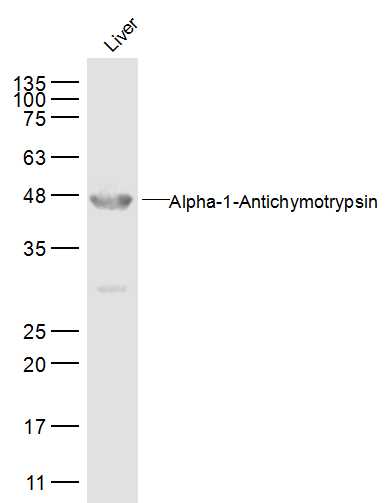Alpha-1-Antichymotrypsin (SERPINA3) (Histiocytoma Marker) (AACT/1452), CF640R conjugate, 0.1mg/mL [26628-22-8]
BNC401452
ApplicationsImmunoHistoChemistry, ImmunoHistoChemistry Paraffin
Product group Antibodies
ReactivityBovine, Human, Mouse
TargetSERPINA3
Overview
- SupplierBiotium
- Product NameAlpha-1-Antichymotrypsin (SERPINA3) (Histiocytoma Marker) (AACT/1452), CF640R conjugate, 0.1mg/mL [26628-22-8]
- Delivery Days Customer9
- ApplicationsImmunoHistoChemistry, ImmunoHistoChemistry Paraffin
- CertificationResearch Use Only
- ClonalityMonoclonal
- Clone IDAACT/1452
- Concentration0.1 mg/ml
- ConjugateOther Conjugate
- Gene ID12
- Target nameSERPINA3
- Target descriptionserpin family A member 3
- Target synonymsAACT, ACT, GIG24, GIG25, alpha-1-antichymotrypsin, cell growth-inhibiting gene 24/25 protein, growth-inhibiting protein 24, growth-inhibiting protein 25, serine (or cysteine) proteinase inhibitor, clade A, member 3, serpin A3, serpin peptidase inhibitor, clade A (alpha-1 antiproteinase, antitrypsin), member 3
- HostMouse
- IsotypeIgG1
- Protein IDP01011
- Protein NameAlpha-1-antichymotrypsin
- Scientific DescriptionAlpha-1 Antichymotrypsin (AACT) is a plasma protease inhibitor synthesized in the liver as a single glycopeptide chain. In human, the normal serum level of AACT is about one-tenth that of alpha-1-antitrypsin (AAT), with which it shares nucleic acid and protein sequence homology. Both are major acute phase reactants; their concentrations in plasma increase in response to trauma, surgery and infection. Elevated levels of AACT are widely, but not universally, reported in the cerebrospinal fluid and plasma of AD patients. Prostate-specific antigen (PSA) and its SDS-stable complex with AACT are in widespread use as markers for the diagnosis of prostate cancer. AACT deficiency may also be a possible cause of chronic liver disease. AACT antibody reacts with histiocytes and histiocytic neoplasms. It is widely used to identify histiocytes and tumors derived from them. Acinar tumors of the pancreas and salivary gland may also exhibit AACT positivity.Primary antibodies are available purified, or with a selection of fluorescent CF® Dyes and other labels. CF® Dyes offer exceptional brightness and photostability. Note: Conjugates of blue fluorescent dyes like CF®405S and CF®405M are not recommended for detecting low abundance targets, because blue dyes have lower fluorescence and can give higher non-specific background than other dye colors.
- SourceAnimal
- ReactivityBovine, Human, Mouse
- Storage Instruction2°C to 8°C
- UNSPSC12352203






